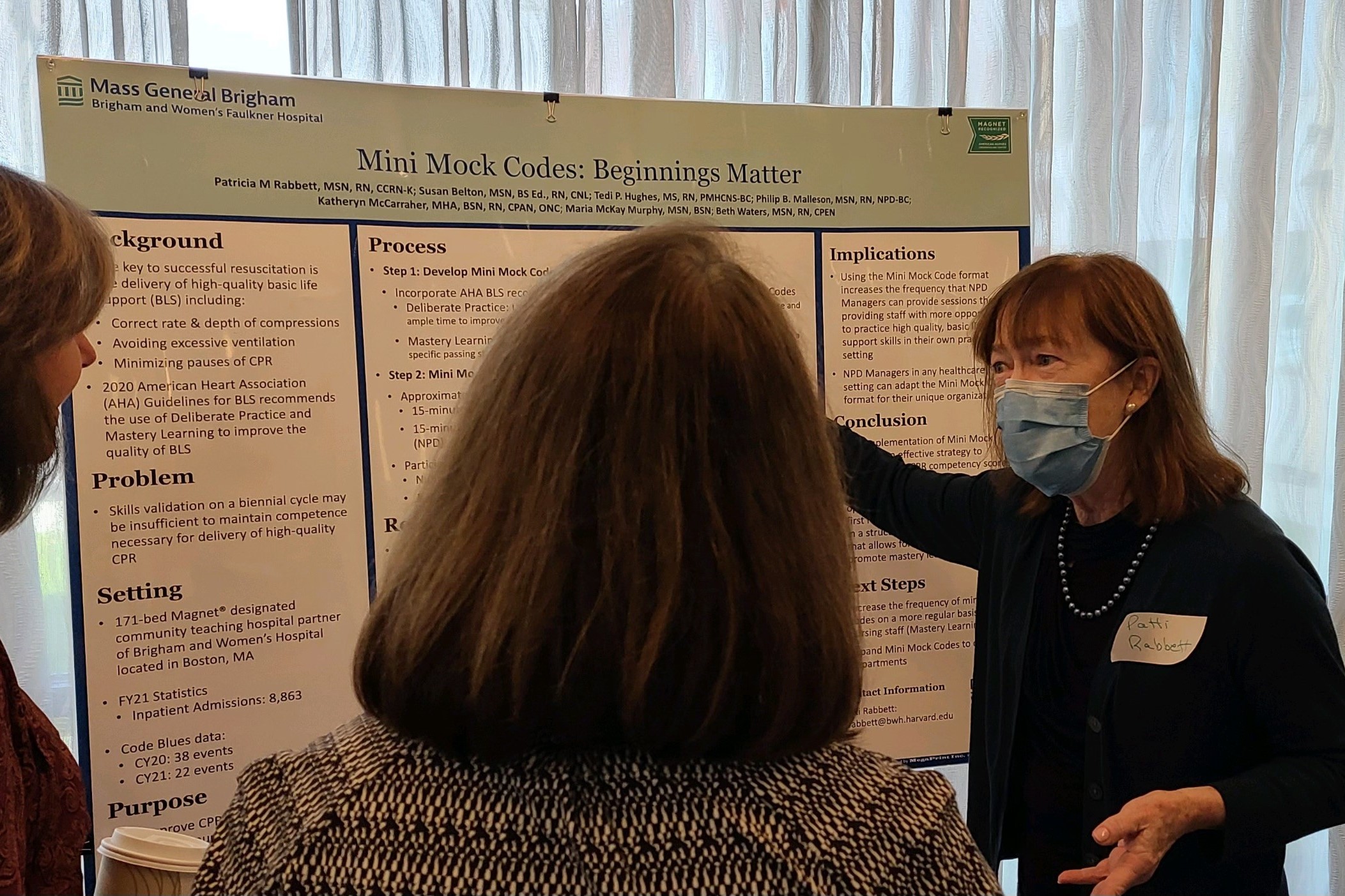Notice of privacy incident at Brigham and Women's Faulkner Hospital Learn More
Header Skipped.
Notice of privacy incident at Brigham and Women's Faulkner Hospital Learn More
Header Skipped.

Patricia Rabbett, MSN, RN, CCRN-K, presents her team’s poster at the NEONE Fall Symposium
At the New England Organization of Nurse Educators (NEONE) Fall Symposium, Nursing Professional Development Manager for Interventional Radiology/Interventional Nephrology, the ICU and Dialysis Patricia Rabbett, MSN, RN, CCRN-K, represented Brigham and Women’s Faulkner Hospital’s Department of Nursing and her Nursing Professional Development colleagues when she presented a poster titled “Mini Mock Codes: Beginnings Matter.”
The poster presentation, authored by Rabbett, Nursing Professional Development Manager for 6 North and 7 North Susan Belton, MSN, BS, RN, CNL, Nursing Professional Development Manager for 2 South Tedi Hughes, MSN, RN, PMHCNS-BC, 6 South, Nursing Professional Development Manager for 6 South and Float Pool Phil Malleson, MSN, RN, NPD-BC, Nursing Professional Development Manager for the PACU, 7 South, Center for Preoperative Evaluation and Pre-Op Holding Kathy McCarraher, MHA, BSN, RN, CPAN, ONC, former Nursing Professional Development Manager for the Operating Room Maria Murphy McKay MSN, RN, and Nursing Professional Development Manager for the Emergency Department, Nursing Supervisors and PCA Float Pool Beth Waters, MSN, RN, CPEN, outlines the importance of high-quality basic life support for patients found unresponsive and the results of the team’s mini mock code project to improve staff’s cardiopulmonary resuscitation (CPR) skills.
In the hospital, when anyone is found unresponsive, a Code Blue is called. This alerts a Code Blue Team who come to provide Advanced Cardiac Life support. However, in the moments before the Code Blue Team arrives, it is critical that the staff member who found the patient begin high-quality basic life support—meaning CPR. CPR should be performed early, at the correct rate and depth, minimizing pauses and avoiding excessive ventilation. CPR training is required every two years, but, because basic life support skills are not used regularly, the American Heart Association recommends frontline hospital staff have intermittent training to maintain skill performance. Recognizing the importance of this intermittent training, the Nursing Professional Development team worked with the Resuscitation and Critical Care Committees to implement mini mock codes—essentially a timed simulation event where a staff member discovers an unresponsive patient and begins CPR on their patient. Under the observation of a member of the Nursing Professional Development team, a CPR mannequin and simulation pads are used to measure the quality of the staff member’s compressions as well as their skills using an AED/defibrillator.
The mini mock codes take less than 20 minutes to complete and can be implemented in any patient care area. “What’s been most surprising is just how well staff have responded to these trainings,” says Rabbett. “The feedback we have received is that they really like the format and even want to do it more often.”
At the NEONE Fall Symposium, Rabbett was impressed by how well received the poster presentation was. “It’s something simple that can be implemented quickly and doesn’t require staff to step away from direct patient care for too long to participate in training,” she says. “It’s really effective in that way and I think that’s why so many symposium attendees were interested. It’s something they could try in any workplace setting.”
Published 12/6/22
Looking for more news from BWFH? Go to News to find articles about health, updates to our programs and services and stories about staff and patients.
Go to News